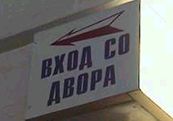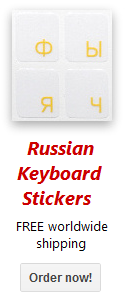 FR FR |
About us | Home | User agreement | Link to us |
The Negative Pronouns
In Russian, pronouns are words that substitute for nouns or adjectives. The negative pronouns никто, ничто, некого, нечего, никакой, ничей, нисколько are used to talk about absent or nonexistent things and people.
Consider these examples:
- В доме ничего нет.
- (There is nothing at home.)
- Он никого не знает.
- (He doesn't know anybody.)
There are many more negative pronouns than listed above. You can make up your own Russian negative pronouns once you know how they are formed. You should be familiar with the interrogative pronouns from our previous lessons.
How to form Russian negative pronouns
The negative pronouns are formed from the interrogative pronouns with the help of such prefixes as не- and ни-. For example:
| Interrogative pronoun | Negative pronoun |
| кто | никто |
| сколько | нисколько |
| что | нечто |
| когда | некогда |
Note that не- is always stressed. It is used to negate. On the contrary, the prefix ни- is never stressed. It is used to intensify negation. Here are some examples:
| Я ничего не делал. I was doing nothing. |
ни- is used to intensify the negation formed by the verb делал and the particle не. |
| Мне нечего делать. I have nothing to do. |
нe- is used to show that an action can not be performed because there is no an object (i.e. there is nothing to do) |
Changes by cases, gender, and number
The negative pronouns никто, ничто change by cases like their interrogative counterparts кто, что.
Change by cases
| Case | никто | ничто |
| Nominative | никто | ничто |
| Genitive | никого | ничего |
| Dative | никому | ничему |
| Accusative | никого | ничего |
| Instrumental | никем | ничем |
| Prepositional | ни о ком | ни о чём |
The negative pronouns некого, нечего do not have the nominative form.
Change by cases
| Case | некого | нечего |
| Nominative | — | — |
| Genitive | некого | нечего |
| Dative | некому | нечему |
| Accusative | некого | нечто |
| Instrumental | некем | нечем |
| Prepositional | не с кем | не о чем |
The negative pronouns никакой, ничей change by gender and number.
| Singular masculine | Singular neuter | Singular feminine | Plural (any gender) |
| никакой | никакое | никакая | никакие |
| ничей | ничьё | ничья | ничьи |
These pronouns change by cases the same way as negative pronouns they were formed from.
Change by cases
| Case | никакой | ничей |
| Nominative | никакой | ничей |
| Genitive | никакого | ничьего |
| Dative | никакому | ничьему |
| Accusative | никого (animate) никакой (inanimate) |
ничьего (animate) ничей (inanimate) |
| Instrumental | никаким | ничьим |
| Prepositional | ни о каком | ни о чьём |
The pronouns некого, нечего are used in impersonal sentences, i.e. those that do not refer to a particular person or thing. For example:
- Нам некого и нечего бояться.
- (We have nobody and nothing to fear.)
Negative pronouns with prepositions
When used with prepositions, the negative pronouns fall into two parts. The preposition is to be placed between the particle не and ни and corresponding interrogative pronoun (кого, кем, etc.). For example:
| Nominative | Pronoun with preposition | Example |
| никого | ни у кого | Ни у кого нет книги. (Nobody has a book.) |
| некого | не у кого | Мне не у кого спросить. (I have nobody to ask.) |
| некому | не к кому | Ему не к кому обратиться. (He has nobody to address to.) |
| никем | ни с кем | Он ни с кем не хочеть дружить. (He does not want to be friends with anybody.) |
Stress patterns
Finally, there are some more examples to demonstrate the stress patterns. Remember, that in Russian negative pronuns, the ни part is never stressed, while the не part is always stressed. Compare the following sentences:
| не | ни |
| Некому приехать к родителям. (There is nobody to visit parents.) |
Никому не надо приезжать. (Nobody has to visit.) |
| Ребёнку не с кем играть. (The child has nobody to play with.) |
Ребёнок ни с кем не хочет играть. (The child does not want to play with anybody.) |
| Мне нечем рисовать. (I have nothing to draw with.) |
Я ничем не хочу рисовать. (I do not want to draw with anyting.) |
Got questions?
Ask them in the Russian Questions and Answers — a place for students, teachers and native Russian speakers to discuss Russian grammar, vocabulary, pronunciation, and other aspects of the Russian language.
Copyright 2001-2026 MasterRussian.com | Privacy Policy | Contact Us
 Russian Lessons
Russian Lessons
- Russian alphabet
- Names of letters
- Russian Q&A new
- Pronunciation: Cons.
- Pronunciation: Vowels
- Noun Gender/Number
- Cases of Nouns
- Russian Greetings
- Personal Pronouns
- Learning Russian
- 1000 Common Words
- 500 Russian Verbs
- Top Russian Nouns
- » All lessons
- » Guest lessons
 Browse Topics
Browse Topics
- Start learning Russian
- Forum
- Bookstore
- Dictionaries
- Russian - basic
- Russian - adv
- Pronunciation
- Russian Blog new
- Reading
- Test & quizzes
- Translation
- Verbs
- Verb Conjugations
- Russian numbers
- Russian Tests new
- Vocabulary
- Writing
- Folk music
- Fun stuff
- Leo Tolstoy
- Learner's lore
- Literature
- Personal blogs
- Picture Dictionary new
- Proverbs
- Publications
- Radio & TV
- Russian culture
- Schools in Russia
- Russian Words
- Russian names
- Software
- Russian Words iPhone
Clicks the "Like" button below to get daily updates on Facebook!
Click "Add to circles" to learn Russian on Google+

Search MasterRussian

English » Russian dictionary

WORD OF THE DAY
![]() RSS
|
iGoogle
|
My Yahoo!
RSS
|
iGoogle
|
My Yahoo!
Meaning: to give, to let, to allow
Pronunciation: [daht']
Learn Russian words! »
TODAY'S STREET SIGN

Russian: Вход со двора
English: Entrance from the backyard
FOLLOW US ON TWITTER

MasterRussian on Twitter


